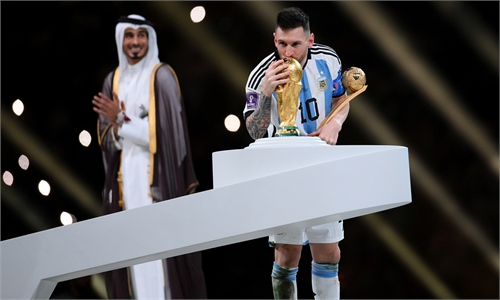SPORT / MISCELLANY
Full house expected for Chinese national football team's dead-rubber qualifier

Wang Yudong (Left) of China shoots during the 2026 FIFA World Cup Asian Qualifiers Group C match between China and Indonesia in Jakarta, Indonesia, June 5, 2025. Photo: Xinhua News Agency
"The primary significance of the match against Bahrain lies in helping China avoid finishing at the bottom of its group in the Asian Football Confederation's final qualifying round, as it no longer carries competitive implications for World Cup qualification," Wang Dazhao, a Beijing-based sports commentator, told the Global Times on Sunday.
The Chinese squad returned to Chongqing from Jakarta late Thursday following a 1-0 defeat to Indonesia that confirmed their elimination from the Asian qualifiers. The loss marked their sixth consecutive World Cup absence since 2002.
With only one game remaining, China cannot finish in the top four of Group C. China now sits at the bottom of the group with six points from nine matches, while Indonesia climbs to third with 12 points. Only the top two teams in each six-team group will directly qualify for the World Cup, with third- and fourth-placed moving to another qualifying phase.
China won only two out of nine matches in Group C, which also includes Japan, Australia, Saudi Arabia, Bahrain and Indonesia.
"This team has been fighting for this goal for over 20 years," head coach Branko Ivankovic said at a post-match press conference, according to the Xinhua News Agency.
"We believed that if we could reach the next stage from this tough group, we would have a strong chance at qualifying. But we didn't succeed, and as head coach, I definitely bear significant responsibility."
Ivankovic should indeed bear primary responsibility for China's elimination from the World Cup qualifiers, Wang said, noting Ivankovic's overly conservative tactics and a lack of bold decision-making. He added that the absence of veteran players, particularly star striker Wu Lei, also affected the team's performance against Indonesia.
The Chinese national team should learn from each setback rather than simply saying they will move on, Wang said, adding, "Only by confronting its shortcomings and making meaningful changes can the team hope to improve and really move forward."
The match against Bahrain will take place at the Chonqging Longxing Football Stadium, which seats up to 60,000 spectators. Tickets for the game went on sale on May 23 and sold out in minutes. A final round of ticket sales on Saturday also sold out quickly, Shanghai-based media outlet the Paper reported.
Despite the team's early exit, attendance figures have remained strong throughout the campaign.
From the opening home match against South Korea in Shenzhen, South China's Guangdong Province, China's previous home games in cities such as Tianjin, Shenyang and Dalian in Northeast China's Liaoning Province, Qingdao in East China's Shandong Province, Xiamen in East China's Fujian Province and Hangzhou in East China's Zhejiang Province, saw near-capacity crowds. The March fixture against Australia in Hangzhou drew a record 70,588 fans, the Paper reported.
According to Wang, this enthusiasm for football in China is further fueled by memories of past glories, notably the national team's historic qualification for the 2002 World Cup. Those moments continue to resonate with fans, many of whom grew up believing in the potential of Chinese football. "Many hold an enduring hope that Chinese football can rise again," he said.



